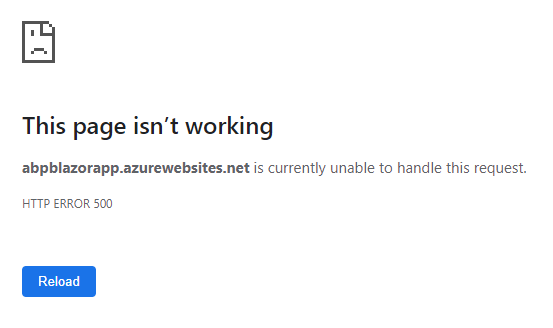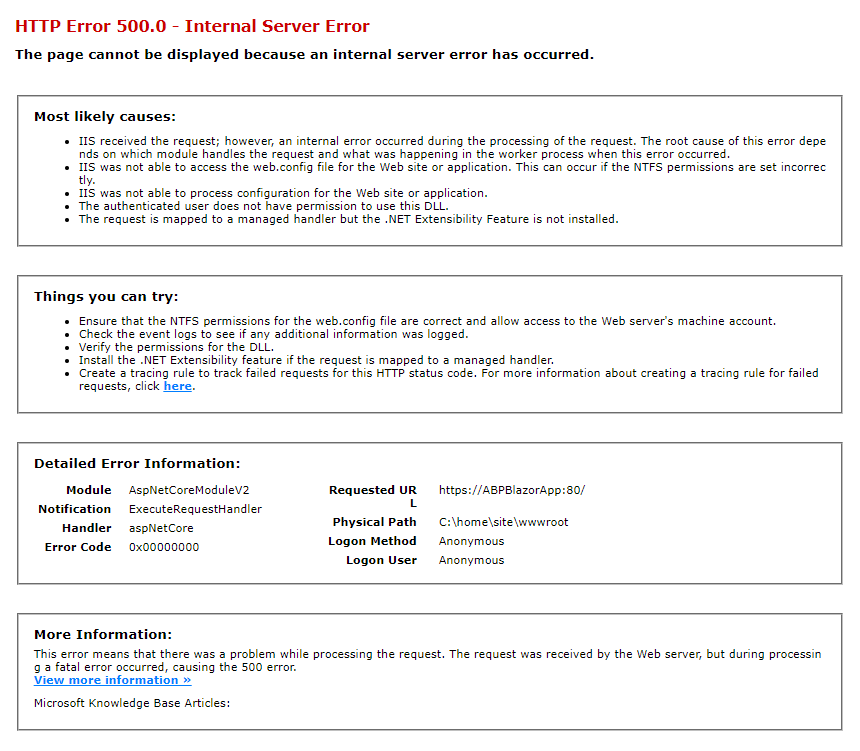Activities of "sid@extranerds.com"
As suggested in the linked question, I did the following:
- I create a console app to generate two self-signed certificates
- I uploaded both certificates into Azure
- I obtained the thumbnails of each certificate
- I added a WEBSITE_LOAD_CERTIFICATES app setting with a value of the two thumbprints, comma separated

The application event log no longer reports an error. It now says the following:
Application 'C:\home\site\wwwroot\' started successfully. Process Id: 2912. File Version: 17.0.22341.2. Description: IIS ASP.NET Core Module V2 Request Handler. Commit: 7c810658463f35c39c54d5fb8a8dbbfd463bf747
However, when attempting to load the app in a browser I now see a different error.

I obtained the source of the error from the logs. Here it is.

I searched the docs and reviewed several similar problems, but none seemed to pertain to the specific error I'm seeing below (or I couldn't find the support document).
I created a Blazor Server app named "ABPBlazor" using ABP Suite, used DbMigrator to set up the database on an Azure SQL database, pushed the code to an Azure DevOps Git repo where a build/package/deploy pipeline released it into an Azure app service. I am now trying to run the application and I'm getting an error. Thanks for your assistance.
- ABP Framework version: v7.0.1
- UI type: Blazor
- DB provider: EF Core
- Tiered (MVC) or Identity Server Separated (Angular): no
- Exception message and stack trace: See below
- Steps to reproduce the issue: Visit https://abpblazorapp.azurewebsites.net/
Here is the error:
HTTP Error 500.30 - ASP.NET Core app failed to start
Application '/LM/W3SVC/719996520/ROOT' with physical root 'C:\home\site\wwwroot' has exited from Program.Main with exit code = '1'. First 30KB characters of captured stdout and stderr logs:
[18:45:42 INF] Starting web host.
[18:45:46 FTL] Host terminated unexpectedly!
Volo.Abp.AbpInitializationException: An error occurred during ConfigureServicesAsync phase of the module Volo.Abp.OpenIddict.AbpOpenIddictAspNetCoreModule, Volo.Abp.OpenIddict.AspNetCore, Version=7.0.1.0, Culture=neutral, PublicKeyToken=null. See the inner exception for details.
---> System.Security.Cryptography.CryptographicException: Access is denied.
at System.Security.Cryptography.X509Certificates.StorePal.FromSystemStore(String storeName, StoreLocation storeLocation, OpenFlags openFlags)
at System.Security.Cryptography.X509Certificates.X509Store.Open(OpenFlags flags)
at Microsoft.Extensions.DependencyInjection.OpenIddictServerBuilder.AddDevelopmentEncryptionCertificate(X500DistinguishedName subject)
at Microsoft.Extensions.DependencyInjection.OpenIddictServerBuilder.AddDevelopmentEncryptionCertificate()
at Volo.Abp.OpenIddict.AbpOpenIddictAspNetCoreModule.<>c__DisplayClass1_0.<AddOpenIddictServer>b__0(OpenIddictServerBuilder builder)
at Microsoft.Extensions.DependencyInjection.OpenIddictServerExtensions.AddServer(OpenIddictBuilder builder, Action1 configuration) at Volo.Abp.OpenIddict.AbpOpenIddictAspNetCoreModule.AddOpenIddictServer(IServiceCollection services) at Volo.Abp.OpenIddict.AbpOpenIddictAspNetCoreModule.ConfigureServices(ServiceConfigurationContext context) at Volo.Abp.Modularity.AbpModule.ConfigureServicesAsync(ServiceConfigurationContext context) at Volo.Abp.AbpApplicationBase.ConfigureServicesAsync() --- End of inner exception stack trace --- at Volo.Abp.AbpApplicationBase.ConfigureServicesAsync() at Volo.Abp.AbpApplicationFactory.CreateAsync[TStartupModule](IServiceCollection services, Action1 optionsAction)
at Microsoft.Extensions.DependencyInjection.ServiceCollectionApplicationExtensions.AddApplicationAsync[TStartupModule](IServiceCollection services, Action1 optionsAction) at Microsoft.Extensions.DependencyInjection.WebApplicationBuilderExtensions.AddApplicationAsync[TStartupModule](WebApplicationBuilder builder, Action1 optionsAction)
at ABPBlazor.Blazor.Program.Main(String[] args) in D:\a\1\s\src\ABPBlazor.Blazor\Program.cs:line 36
Process Id: 16792. File Version: 17.0.22341.2. Description: IIS ASP.NET Core Module V2 Request Handler. Commit: 7c810658463f35c39c54d5fb8a8dbbfd463bf747
Nevermind. I figured it out on my own. I had to uninstall ABP Suite, re-authenticate, create a new dummy application/solution, get the license key from the source code in that application, and copy it into the source code of my original application. The reason is because my application was created while I was still using the trial license. It wasn't clear that any applications created while using the trial license would need to be updated with a new license key (or how to do it). But, again, I figured it out.
hi
Please try to run app via
dotnet runcommand the check the output and logs.
When we run the app via dotnet run we get the following output...
[10:16:50 INF] TRIAL-INFO - You are using the trial version of ABP and your expiry date is 2023-01-09
[10:16:51 ERR] ABP-LIC-0018 - djcw(redacted)jUX0: Your trial period has ended! - Please contact to license@abp.io to purchase a license.
I redacted some of the text above because I wasn't sure if it's private data. I went to the "Organization Management" page on the ABP Commercial website to view my license info. I see my API key, and I confirmed that this matches the API key we have on our NuGet.Config file (key="ABP Commercial NuGet Source").
Our license expires Jan 2, 2024. Our trial expired Jan 9, 2023, but as far as I know we are not using the trial license anymore. Is there some other place in our code we need to replace the trial license key with the purchased license key? In short, why is it still trying to use our trial license?
We have a VS solution created in ABP Suite which was running perfectly. Suddenly, with no changes to the code, the application will no longer run in Visual Studio. With the Blazor application set as the startup project, if I hit F5 to run the app for local debugging, the Chrome browser window opens for a few seconds, attempts to load https://localhost:44326/ and then disappears. The application has stopped running and I'm back in VS 2022 with no explanation of what has occurred other than a message in the Debug window that says "The program '[64480] iisexpress.exe' has exited with code 4294967254 (0xffffffd6).". We have three developers. Our Team license expires next year. All three developers started experiencing the same issue at the same time. Is this a licensing issue, perhaps due to the recent release of ABP 7.0? We haven't upgraded yet. Is that required? What could be the problem here, or what steps do we take to determine what the problem is?
- ABP Framework version: v6.0.1
- UI type: Blazor
- DB provider: EF Core
- Tiered (MVC) or Identity Server Separated (Angular): no
- Exception message and stack trace: The program '[64480] iisexpress.exe' has exited with code 4294967254 (0xffffffd6).
- Steps to reproduce the issue: Open the ABP solution in VS 2022. Use F5 to run the Blazor app.